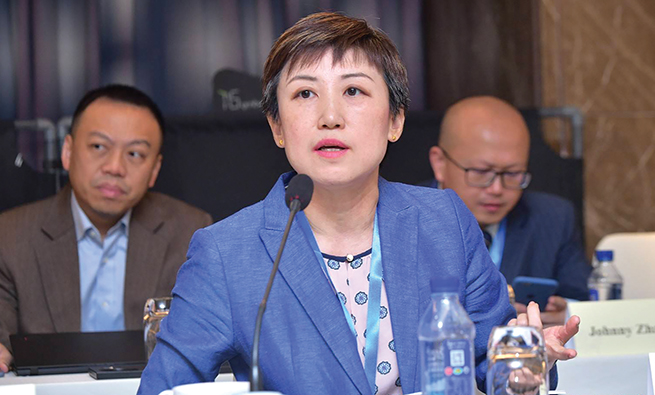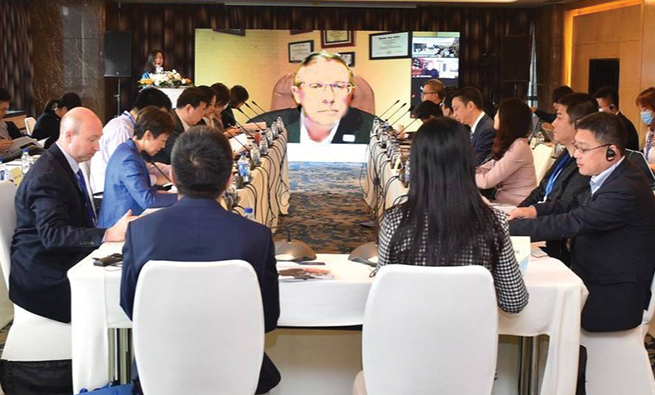Financial managers and tech experts from around the globe gathered in person and virtually for in-depth discussions on the advancement of robotic process automation (RPA) in global financial digital transformation. The goal was to understand the development stages and future trends of RPA from technical and practical points of view in order to promote corporate financial automation transformation and to build core capabilities in digital finance.
The development of new technology has brought disruptive changes to the financial field. Digital technology supports enterprises for advanced analysis, efficient operations, and strategic decision making. At the same time, it also provides more possibilities and opportunities for the transformation of financial functions.
As a feasible solution, RPA is suitable for organizations of different sizes. It can process financial data more accurately and efficiently to facilitate advanced analysis and strengthen risk control and corporate compliance. The application of RPA can promote an exponential improvement in corporate operational efficiency, reduce the cost of traditional financial transaction processing, and create new jobs for accounting analysts.
The finance leaders in attendance discussed the need and ways to implement the technology, as many companies in China haven’t begun or are in the very early stages of adoption. There was great energy and optimism in the room from the leaders about the opportunities RPA presents for China.
“RPA is not to replace people with machines or automated processes, but to save the time for both customers and employees,” said Jin Songhua (Echo Jin), CFO of Microsoft Greater China. “Finance professionals could shift their focus to discover problems through data analysis, finding directions for improvement and for future strategic guidance, instead of low-level, repetitive tasks.”

Jin Songhua (Echo Jin), CFO of Microsoft Greater China, discussed RPA.
Chen Hu, president of ZTE’s Shared Service Center, and Cheng Ping, associate dean of the School of Accounting at Chongqing University of Technology, served as the moderators of the live discussion sessions in the morning and in the afternoon, respectively. A total of 33 C-suite panelists joined the discussions. The scale of RPA implementation, the specific difficulties and challenges in the RPA implementation process, and the CFO’s role in leading RPA implementation were the three key focuses of the discussions.
“The first thing is to identify some scenarios that are suitable for RPA,” Li Huimin (Susan Li), deputy general manager of Tencent’s Financial Shared Service Center, said. “Such functions that are labor-intensive, processing repetitive tasks on a large scale, and requiring simple changes to the errors found.” Regarding the drawback of RPA, she added, “RPA is based on rules; it can’t evolve. AI can continuously evolve through self-learning. If RPA can be combined with AI, they can complement each other effectively.”
David Wray, senior director of global accounting and reporting at Huawei, shared his company’s experience with RPA, emphasizing the importance of process improvement. “If the process is not efficient from the start, automating it will only make things worse,” he said. “Once the process is efficient enough, then you can start the automation. RPA has a finite life and automation is not the solution itself, but to make it work for us, it is very important that we think about what other technologies can be combined with RPA and can be used after the completion of RPA.”
IMA President and CEO Jeff Thomson emphasized that new technologies like RPA, process mining, blockchain, and AI are advancing very rapidly. Although the development of new competencies like data science is progressing in our profession, this progress isn’t as rapid as advances in technology. He said we must speed up the pace of upskilling in data science, analytics, visualization, and strategy to leverage the new technologies.

Jeff Thomson attended virtually and emphasized the need to upskill in new technologies.
Zhong Zheng, finance director of Midea Group, said, “As CFOs, we must continue to promote learning and growth within the organization, drive the entire financial team to pursue new knowledge, learn new tools, and stay with new technologies—hence, to lead the transformation of the entire organization.”
Loreal Jiles, director of research—digital technology and finance transformation at IMA and author of IMA’s Statement on Management Accounting Transforming the Finance Function with RPA, said in her keynote speech that a faster and more efficient solution is needed in today’s business environment.
“RPA presents a clear and sustainable avenue toward the foundation for a transformed finance function,” Jiles said. For the application of emerging technologies, many companies are still in the testing stage. Jiles emphasized that unlike other digital transformation projects, RPA is an emerging technology with a low barrier to entry, and, because of this, organizations tend to underestimate the complexity of RPA planning. She said, “Keys to successfully scaling RPA are establishing governance, not compromising on resource quality, and automating the right process.”
“RPA is not technology-centric; it’s people-centric,” said Wu Wei (Gabriel Wu), president of UiPath Greater China. “To make RPA successful, we need artificial intelligence, reliability, timeliness, agility, and governance, which align with five Chinese traditional virtues.”
“I hope everyone will pay attention to smart finance,” said Cai Lei, vice president of JD.com, Inc. “Big Data on finance will become the core of corporate operation and management.”

February 2021



